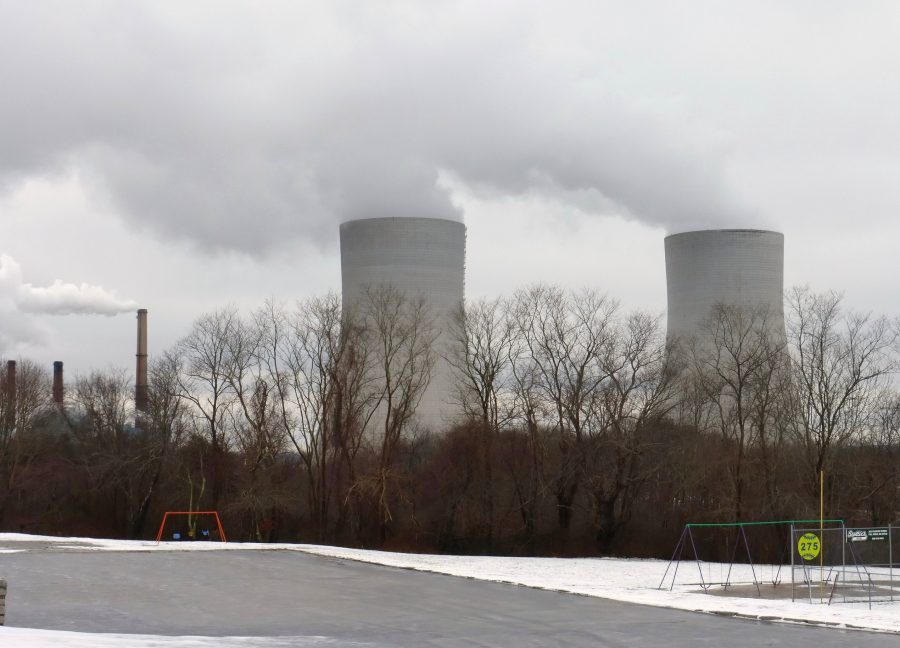Dr. James K. Boyce of the University of Massachusetts Amherst delivered the presentation “Climate Policy As If the Present Generation Matters” at the University of Massachusetts Boston’s Campus Center on March 23. The Department of Economics, the School for the Environment, and the Consortium on Gender, Security and Human Rights sponsored the talk as part of the Spring Economics Seminar Series.
Dr. Boyce’s talk addressed the effect of climate policy in the present, a perspective change from the focus on future generations often invoked in climate change policy talks.
Dr. Boyce focused on carbon-pricing, which, according to him, is often framed in terms of a discouraging “eat your broccoli” scenario—we must pay a cost for carbon emissions, this cost will require a sacrifice, and a moral obligation to pay this cost exists. In contrast to this gloomy scenario, Dr. Boyce outlined a constructive policy he dubbed “cap-and-dividend,” a redistribution of revenues generated from the pricing of carbon or the taxing of carbon emissions to the people on a per-capita basis.
Pricing carbon results in a two-fold benefit: improved air quality and the creation of a “carbon rent,” or the pool of money spent for the untaxed fossil fuels we already consume. Raising the price of fossil fuel emissions now could result in immediate benefits, rather than the hypothetical benefits of waiting for clean energy infrastructure to be built; furthermore, raising the price of emissions drives short-term emissions reductions.
As fossil fuel burning is a necessity and not a luxury, a high price would be required to stimulate a change in usage; under a policy which raises the price of carbon consistently over time, Dr. Boyce says, “[people] have an incentive to make investments now to save money down the road.”
If such a policy of carbon rents became legislation, three main avenues exist to distribute the revenue. Permits for emitting could be given away, through which corporations would benefit with massive profits. Permits could be auctioned off by the government, filling state coffers and requiring a faith in government to fairly distribute the funds. Or, under the cap-and-dividend program, the rent money could be distributed to the people “as equal per capita dividends” by auctioning permits and then recycling the revenue.
Under this third policy—Dr. Boyce’s preferred proposal—as the price of gas rose, so too would the dividends of the impoverished. The proposed policy “protects the purchasing power of working families,” according to Dr. Boyce, because emitters pay according to their emissions; this creates “a way you insulate most of the population from the adverse effects” of fuel price rises, because even as prices rose, the dividend payouts would rise. Dr. Boyce presented the hypothetical situation of the penny-pincher actually thanking the driver of the gas-guzzling luxury SUV for increasing his or her dividend share.
Charging a price for carbon emissions essentially converts an “open access resource” into a form of property and creates “property rights,” leading to the question of who owns that right to put carbon into the atmosphere. Dr. Boyce warned that the environmentalist solutions of “keep the oil in the soil and the coal in the hole” and “just say no” to extraction simply leads to higher profits for those who do not leave fossil fuels in the ground (the Exxon Mobile and Koch Brothers models). The economics of that point seem clear.
As a final direct message to UMass Boston students and young people in general, Dr. Boyce said, “The future is in your hands. It sounds trite, but it’s true. Our political leaders will not deliver policies to stabilize the climate unless you organize to make them do it.”
To those who would support his cap-and-dividend policy, Dr. Boyce suggested, “Call or write to your state senator and state representative urging them to support legislation that puts a price on carbon and returns the money to the people as dividends.”
‘Climate Policy As If the Present Generation Matters’: A Look at Carbon Pricing
March 24, 2017





















































